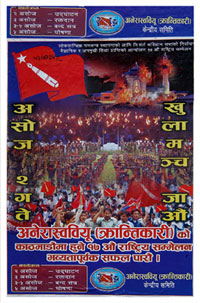 It is in the interest of the Nepali people and the Maoists themselves that the CPN (Maoist) convert itself into a political party. Despite all the sabre-rattling, we believe that is the direction the party is taking. Its Kamidanda central committee meeting decided to continue the fight above ground and peacefully. Obviously, there is no mood, nor perhaps energy, among the comrades to go back to the jungle.
It is in the interest of the Nepali people and the Maoists themselves that the CPN (Maoist) convert itself into a political party. Despite all the sabre-rattling, we believe that is the direction the party is taking. Its Kamidanda central committee meeting decided to continue the fight above ground and peacefully. Obviously, there is no mood, nor perhaps energy, among the comrades to go back to the jungle.
The current Maoist strategy seems to be to ratchet up the decibel level of radical sloganeering before the country closes down for Dasain. There is a lot of loose talk that goes against the November 12-point understanding: it was agreed that key issues of state restructuring, including the place of the monarchy, be left to the constituent assembly.
The comrades desperately want it, yet they will not consider (at least publicly) the matter of laying down arms before assembly elections. They need to explain to us how an election will happen when they, as only one of Nepal's many parties, continue to hold arms. The Nepali people have proved amply through their show of strength in April's people's movement that we value freedom and pluralism. Elections held under the threat of arms just can't happen.
Whichever way you look at it, the matter boils down to 'arms management': the original Nepali phraseology meant to make it feasible for a group that does not believe it has 'lost' to consider demobilisation. Our understanding of arms management is simple: total civilian control of the Nepal Army and eventual demobilisation of the Maoists. Since the 'double lock' formula was thought to be premature for the Maoists to sell to their warriors, the agreement for now is to have the NA in the barracks and the PLA in cantonments. But unless the Maoist militia is also corralled, the formula makes little sense.
The importance of managing Maoist arms is self evident as we watch the Maoist cadre seek to create a parallel government across the land, carrying out ad hoc justice, forcing 'voluntary' contributions, and riding roughshod over a dispirited bureaucracy and police force. All this is happening because of fear of the arms that the Maoists still hold.
The Maoists could evolve into one of the three main political parties if they renounced violence. But since they're used to forcing their way with the bullet, the comrades don't seem convinced they can win at the ballot.
If the opportunity provided to the Maoists by the April Uprising to come above ground is wasted in needless and short-term radical rhetoric, we are bound to see a slippage in Maoist control over their cadre, and marginalisation of the party.
Chairman Dahal hopefully is not carried away by the romantic welcome his party has received in Kathmandu, and realises that the people of the districts know better than the civil socialites who have lionised him these past weeks.


